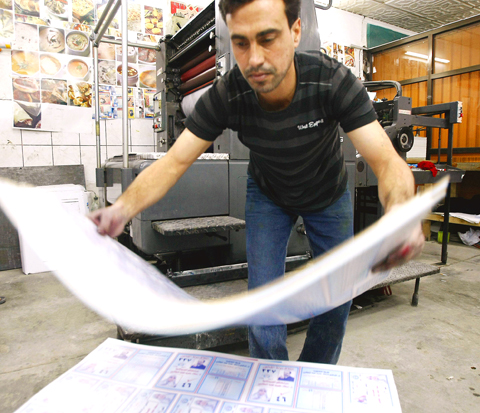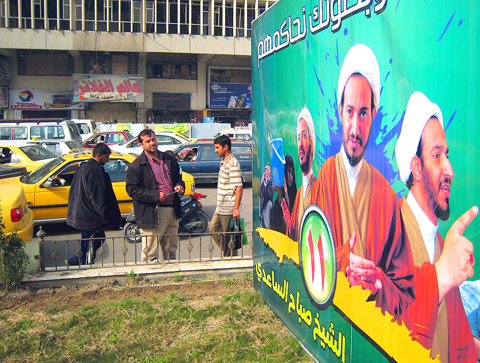Business has never been so good for Iraq’s printers as the runup to the March 7 election, but the boom has its own headaches in a country short on printing presses and rife with religious sensitivities.
“In two weeks, I’ve pocketed what I would normally make in six months,” says Omar Hamid, owner of the Al-Sima printing press in central Baghdad’s Al-Mutanabi neighborhood.
“I’m very happy with democracy. If it were up to me, we would have elections every year,” the 31-year-old adds with a smile.

PHOTO: AFP
The parliamentary election is likely to generate around US$10 million for the country’s 500-odd printing press owners, including US$6 million for the 150 or so in Baghdad alone, printers say.
Demand has been so high since the campaign kicked off on Feb. 12 that Hamid has temporarily suspended printing calendars, books and office supplies, normally the mainstay of his business.
“I’ve been printing campaign materials for 50 candidates across the political spectrum,” he says.

PHOTO: AFP
It is a far cry from the last parliamentary elections, in 2005, when rampant sectarian violence meant taking on certain clients could jeopardise a printer’s safety.
Hamid recalls how he only printed campaign materials for Sunni candidates because Sunni armed groups controlled the neighborhood, a situation that was common at the time.
From 2005 to 2007, despite the US military presence, armed groups effectively ruled Baghdad and the capital’s historic center was in the hands of Sunni rebels and al-Qaeda. Those who disobeyed them faced almost certain death.
The country’s printers are now experiencing difficulties of another kind.
“I am under pressure because the candidates waited until the last minute,” Hamid says, almost shouting over the din of his printing presses. “They wanted to know their rank on their party list and be sure that they were not barred from running because of links to the Baath party.”
He was referring to a controversial decision by the Justice and Accountability Committee to bar 456 candidates with alleged links to former Iraqi dictator Saddam Hussein’s Baath party.
Close to Hamid’s printing shop, the Al-Qama graphic design firm is also hard at work. While large political parties have produced their own campaign posters, smaller groups and individual candidates often give the job to businesses like Al-Qama.
Aamer Ajami, who co-owns the company with his three brothers, says a candidate recently entered Al-Qama’s offices with nothing but a photograph and a pile of cash.
“He gave us carte blanche with just one request ... that we find photos of a school or a hospital and say on the posters that he built it,” says 31-year-old Ajami, who learned graphic design in Jordan.
That level of responsibility has led to problems.
A Shiite candidate, Sheikh Hussein Salman al-Maraabi, refused an Al-Qama delivery because it showed a woman dressed in black, as a sign of mourning, with her bare hands raised in the air.
“He said to us ‘We are Muslims, how dare you print pictures of women whose hands are not covered in gloves,’” Ajami says.
Sunni candidates, meanwhile, have their own concerns.
The National Concord Front forbids female candidates from publishing their photos, and Ajami’s younger brother Khaled says for one of them, Faiza Ahmed, he replaced her picture with that of a craggy-faced farmer.
“With the [Sunni] men, we committed a different blunder. We printed a photo of a weeping woman with a black headscarf. But she was Shiite, and Sunnis wear white headscarves,” the 27-year-old says.
Would-be members of parliament are also battling with new rules from the election commission — they can no longer simply paste their campaign posters onto walls, and must instead use pins to affix them, or use more expensive canvas tarpaulin.
“One canvas poster measuring 2.5m by 6m costs around 225 dollars,” says Amer Hussein, the owner of the Dar al-Azdika printing press. “It’s expensive, but even the small candidates are asking for it.”
Sitting in Hussein’s waiting room is Laith Reza of the Movement for the Future of the Self-Employed, a small, largely unknown party fielding 64 candidates in Baghdad.
“The campaign is costing us 50 million dinars [US$43,000 dollars], and hopefully we will have one member elected,” he says.
Concerns aside, business remains brisk for the capital’s printers, with 39-year-old Hussein even turning people away.
“I have stopped taking orders. I cannot deliver on them before the elections,” he says.

CHAMPIONS: President Lai congratulated the players’ outstanding performance, cheering them for marking a new milestone in the nation’s baseball history Taiwan on Sunday won their first Little League Baseball World Series (LLBWS) title in 29 years, as Taipei’s Dong Yuan Elementary School defeated a team from Las Vegas 7-0 in the championship game in South Williamsport, Pennsylvania. It was Taiwan’s first championship in the annual tournament since 1996, ending a nearly three-decade drought. “It has been a very long time ... and we finally made it,” Taiwan manager Lai Min-nan (賴敏男) said after the game. Lai said he last managed a Dong Yuan team in at the South Williamsport in 2015, when they were eliminated after four games. “There is

Chinese Nationalist Party (KMT) lawmakers have declared they survived recall votes to remove them from office today, although official results are still pending as the vote counting continues. Although final tallies from the Central Election Commission (CEC) are still pending, preliminary results indicate that the recall campaigns against all seven KMT lawmakers have fallen short. As of 6:10 pm, Taichung Legislators Yen Kuan-heng (顏寬恒) and Yang Chiung-ying (楊瓊瓔), Hsinchu County Legislator Lin Szu-ming (林思銘), Nantou County Legislator Ma Wen-chun (馬文君) and New Taipei City Legislator Lo Ming-tsai (羅明才) had all announced they

Nvidia Corp CEO Jensen Huang (黃仁勳) yesterday visited Taiwan Semiconductor Manufacturing Co (TSMC, 台積電), as the chipmaker prepares for volume production of Nvidia’s next-generation artificial intelligence (AI) chips. It was Huang’s third trip to Taiwan this year, indicating that Nvidia’s supply chain is deeply connected to Taiwan. Its partners also include packager Siliconware Precision Industries Co (矽品精密) and server makers Hon Hai Precision Industry Co (鴻海精密) and Quanta Computer Inc (廣達). “My main purpose is to visit TSMC,” Huang said yesterday. “As you know, we have next-generation architecture called Rubin. Rubin is very advanced. We have now taped out six brand new

POWER PLANT POLL: The TPP said the number of ‘yes’ votes showed that the energy policy should be corrected, and the KMT said the result was a win for the people’s voice The government does not rule out advanced nuclear energy generation if it meets the government’s three prerequisites, President William Lai (賴清德) said last night after the number of votes in favor of restarting a nuclear power plant outnumbered the “no” votes in a referendum yesterday. The referendum failed to pass, despite getting more “yes” votes, as the Referendum Act (公民投票法) states that the vote would only pass if the votes in favor account for more than one-fourth of the total number of eligible voters and outnumber the opposing votes. Yesterday’s referendum question was: “Do you agree that the Ma-anshan Nuclear Power Plant